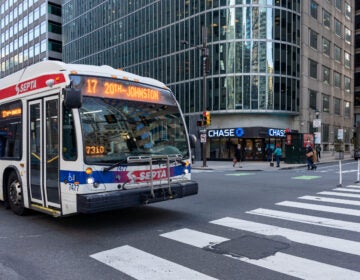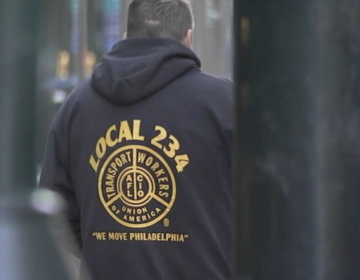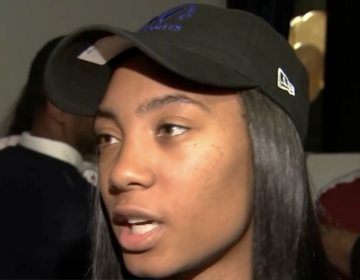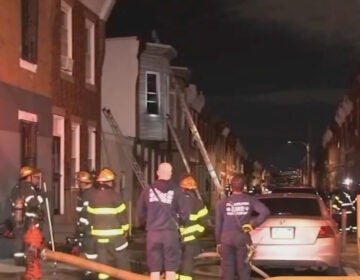SEPTA service would be cut nearly in half under new budget proposal if more funding not secured
The transit authority unveiled a budget proposal that would include a reduction to nearly half of its service, fare increases of more than 20% and cuts to the workforce.
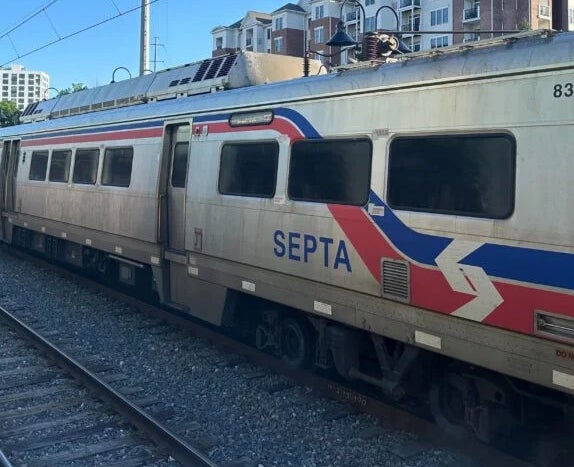
File - A train along the Norristown/Manayunk SEPTA line rolls through the Conshohocken station. (Kristen Mosbrucker-Garza/WHYY)
This story originally appeared on 6abc.
SEPTA unveiled a budget proposal on Thursday that it says would include a reduction to nearly half of its service, fare increases of more than 20% and cuts to the workforce if more funding isn’t secured soon.
Bus, subway and Regional Rail services would all be impacted.
SEPTA said the moves are needed to address an anticipated $213 million budget deficit for the new fiscal year that begins July 1.
Under the plan, customers would see a 45% service reduction, including the elimination of dozens of bus routes and significant reductions in trips on all rail services, beginning with the launch of fall schedules on Aug. 24, SEPTA said.
The SEPTA board will vote on the budget proposals June 26.
SEPTA released the following timelines of service cuts and fare increases under the proposed budget:
Beginning Aug. 24, 2025: 20% service cut
- 32 bus routes eliminated
- 16 bus routes shortened
- Service reduced on 88 bus, metro, and Regional Rail lines
- End of all special service (Sports Express, etc.)
September 2025: 21.5% fare increase
- Complete hiring freeze (including operators)
- Base fare increased to $2.90
Beginning Jan. 1, 2026: Additional 25% service cuts
- 5 Regional Rail routes eliminated
- 18 additional bus routes eliminated
- Broad-Ridge Spur [B3] eliminated
- Routes 10 [T1] and 15 [G1] trolleys converted to buses
- 9 p.m. curfew on all remaining metro and Regional Rail services
Paratransit services in impacted lines would be eliminated, though SEPTA said it will provide some paratransit service consistent with federal guidelines.
For a full list of service cuts, visit this page at SEPTA.org.
The transit agency said it would also have to freeze salaries and hirings and cut contracts starting in the fall.
SEPTA said it is facing a shortfall due to the end of federal COVID relief funds and increases in day-to-day costs of providing service.
“While ridership has recovered over the last few years, SEPTA has had to take on additional costs to address emerging challenges — particularly crime, disorder and the vulnerable population,” the authority said.
SEPTA said it has also had to “grapple with the impact of inflation on everyday necessities such as fuel, power and supplies.”
Authority leaders said they have already taken what they call “aggressive austerity measures” to save money, including a freeze on management pay and cuts to third-party consultants, which has saved $30 million.
The recent 7.5% fare increase and the resumption of paid parking at Regional Rail lots have also generated new revenue, SEPTA said.
“We know how critical service is to our customers and the region, and we have done everything possible to avoid the drastic measures that are proposed in this budget,” said Interim General Manager Scott Sauer.
Gov. Josh Shapiro says his proposed funding for SEPTA passed through the state House of Representatives three times, but the state Senate failed to act once.
“We have known for some time that SEPTA is in dire straits,” he said. “I’m hopeful that the Senate will take up this proposal and finally get it done. I’m committed to mass transit. I want to see them committed to it as well.”
Senate Majority Leader Joe Pittman, a Republican from western Pennsylvania, noted that SEPTA has made progress with making cuts. However, he said the transit agency needs to do more.
“The state cannot be left fully footing such a large transit increase. Given their own struggle with a structural deficit, I believe SEPTA should have an appreciation for our commonwealth’s fiscal deficit and come to the table with more modest requests,” Sen. Pittman said.
Late last year, Shapiro diverted more than $150 million in federal highway funding to provide a one-time injection of cash into SEPTA to help it avoid near-term cutbacks and fare increases for the current fiscal year, which ends on June 30, 2025.
SEPTA will hold four public hearings about the proposed fiscal year 2026 operating budget at SEPTA headquarters on May 19 (11 a.m. and 5 p.m.) and May 20 (10 a.m. and 4 p.m.)
The capital budget hearings will be held on May 21 at 10 a.m. and 4 p.m.
In addition to commenting in person, SEPTA said the public can submit comments by email at operatingbudget@septa.org and capbudget@septa.org, voicemail by calling (215) 580-7772 for Operating Budget and (215) 580-7771 for Capital Budget, or U.S. mail (SEPTA Budgets, 1234 Market St., 9th Floor, Philadelphia, PA 19107. Comments must be submitted by May 28.
SEPTA said it will “thoroughly review all public feedback” before the operating and capital budget proposals are sent to the SEPTA board for a vote on June 26.
For more information on the fiscal year 2026 budget proposal, visit this page at SEPTA.org.
WHYY is your source for fact-based, in-depth journalism and information. As a nonprofit organization, we rely on financial support from readers like you. Please give today.


